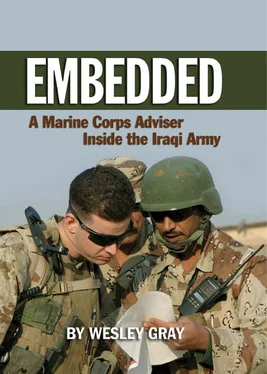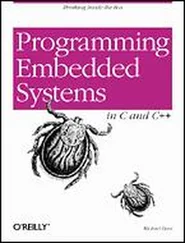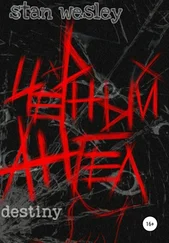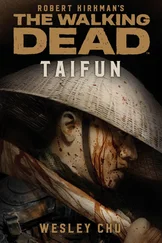We cleared all of Bani Dahir without a single violent incident. Not even a single shot was fired. Not a single weapons cache was found, and there was barely a soul in the street. I imagined we would chalk this up as a victory. But the operation was too easy. Something was obvious to me: All the insurgents in the village knew we were coming and had managed to leave town. I hoped that when we cordoned and searched Kaffijiyah word would not travel and we would surprise any unsuspecting insurgents. Perhaps we would get lucky.
Gunnery Sergeant Horvath, Captain Chin, and I split up and went with three Iraqi squads into Kaffijiyah, a small village nestled alongside the Euphrates. The Iraqi squad I was with would clear the north side of town, Horvath’s would clear the center, and Chin’s would clear the southern portion. As in the Bani Dahir operation, Colonel Abass ordered us to take all weapons from the residents of Kaffijiyah. The local civilians were not happy. I tried to explain Abass’s order to the townspeople, and the common response was that the Iraqi soldiers were corrupt and want to sell their weapons in Baghdad when they go on leave. I tried to convince them otherwise, but to no avail. According to the residents of Kaffijiyah, the jundi are Ali Babbas, a colloquial term for “thieves.” Iraqis tend to believe that any Iraqi who is not in their family cannot be trusted.
The biggest issue with the operation was the tactical incompetence of Captain Najib, the 4th Iraqi Company commander, who was everything Iraqis look for in an officer. He had a sense of entitlement and confidence, his manners were precise and his professionalism was keen, and he was feared by his men. The general Marine opinion of Captain Najib, however, was that he was an idiot in an Iraqi uniform.
The original plan for the operation was to have three squads move in line from west to east. This way we would ensure the town was cleared systematically. According to the plan every few hundred meters the Iraqi squad leaders would check back with Najib and make sure everyone was in line. The intent of keeping the squads roughly in line was so one squad didn’t get too far out in front of the others. If this were to occur, the danger of Iraqi friendly fire would increase dramatically.
Halfway through the town it was clear the squads were out of whack. Our squad was at least five hundred meters behind the center squad, and the southern squad was probably three hundred meters in front of the center squad. If we were attacked from any direction, we were in for disaster. Realizing the tactical dilemma we faced, I left my squad to find Najib and help him rectify the problem. He was nowhere to be found. I talked to jundi in the center squad and they directed me forward. Sure enough, five hundred meters in front of the center squad was Najib with a few soldiers scouting the area. Horvath and I approached Najib, who was sitting in the direct firing line of his center squad, oblivious to where his troops were in the town. Horvath picked up his pace and mumbled under his breath to me, “This fucker is going to have my boot in his ass.”
Horvath caught up to Najib and addressed him in broken Arabic. As Horvath berated Najib, Najib seemed to lose his ability to understand Horvath’s broken Arabic and English. Iraqis sometimes have bad cases of “selective hearing.” Horvath gave up and stomped off. I figured I would take my shot with Najib. I tried the friendlier, helpful approach, thinking I could appeal to the Arab in Najib. “Najib, why are you in front of all the troops? If there is a firefight you will be shot. Do you even know that the squads are all misaligned?” Najib responded confidently, “I need to see the battlefield up ahead. My men will not shoot me, they know where I am. Plus, there are no insurgents in this area anyway.” From Najib’s tone I knew he had resorted to a “fuck the Americans” attitude and I would have no luck in changing his mind. We were destined to clear Kaffijiyah in the least tactically sensible way.
Najib’s poor tactical decisions throughout the day were dragging down our morale. Something good had to be coming our way, and indeed the good news came. We ran into a police colonel who worked in the area and could provide us with much-needed human intelligence. Najib called back to Colonel Abass to report the news.
Without giving details Najib told us we would be in the police colonel’s home for a while until he had updates from Colonel Abass. We apprehensively agreed and posted security on the police colonel’s home. Remarkably it turned out that Abass and this man had a long history in the old Iraqi army.
Five minutes later an entourage of Iraqi Humvees came flying through the town. In true Iraqi fashion, Abass has decided to bring his entire personal security detachment to this man’s house in the middle of our searching operation. He wanted to have tea, talk about the local area, and get an assessment of the situation in Kaffijiyah.
Colonel Abass and the police colonel conversed in Arabic for fifteen minutes before I lost interest and noticed a cute Iraqi boy, no older than five. He sprinted to me and spoke in perfect English, “Give me.” I responded in English, “You sure are direct, aren’t you?” He snapped, “Mister, give me.” I ruminated. On the one hand, I did have some toys, but this kid was rude. On the other hand, if we could get in with this kid’s police colonel father, we would have access to a lot of intelligence. I made my decision and threw the kid one of the toys I had in my drop pouch.
The little boy dived on the toy, ran into his house, and came dashing at light speed toward me to shout again, “Give me!” I played the kid’s little game for a few more rounds, not able to resist the idea I could win his heart and mind. I snapped back to reality and realized I was being used. This kid had ratholed a pile of the things I had given him and was coming back for more. As long as the gravy train was in town, he was going to get more than his fair share.
I focused my attention back on Colonel Abass, who had finished speaking with his old friend. The police colonel’s parting words were that the insurgents in the Triad were in their last throes of survival and were depending on thievery and burglary to support their attacks on the Iraqi army and Marines. According to him they would be out of the area within months because the people were fed up. I knew one thing. I wasn’t holding my breath for this guy’s prediction to come true. Insha’allah (God willing) this guy is right!
Despite all the minor setbacks with Najib, the day clearing homes in Kaffijiyah was successful. No insurgents attacked, we received some solid intelligence from the local residents, and we found no caches or evidence of insurgents working in the area. It was time to get some chow. We helped Najib round up his men and headed to the battalion mobile command post (CP), which overlooked Kaffijiyah from a hill eight hundred meters away. Captain Chin and I started our walk to the CP when the Iraqi ambulance came screaming in our direction. I thought to myself, what is wrong now?
The ambulance stopped right alongside us as the dust cloud following engulfed us, proving that being invisible is possible in Iraq. It was my medic buddies Hussein and Muhammad. Excited, they yelled at us to hop in the back. We obliged after a short calculation: we could either hitch a ride in the back of an Iraqi ambulance with no armor and no turret gunner and be driven by a couple of crazy Iraqis or we could walk a mile wearing over eighty pounds of gear, suffering in 125-degree heat. Sometimes comfort-based decisions are the way to go. We hopped in the back of the medical vehicle and grabbed onto whatever we could find as Hussein put the pedal to the metal.
Читать дальше












